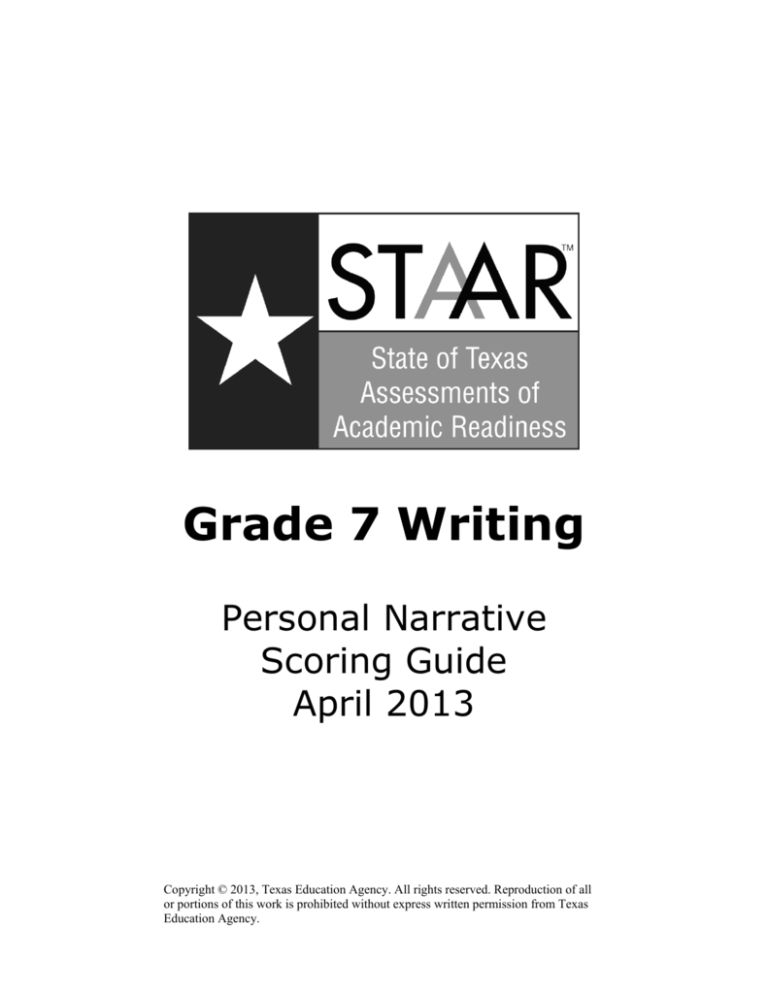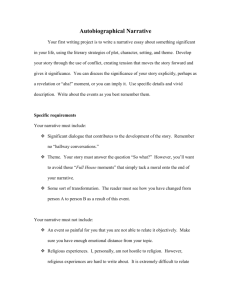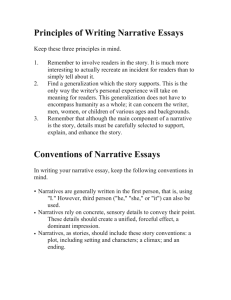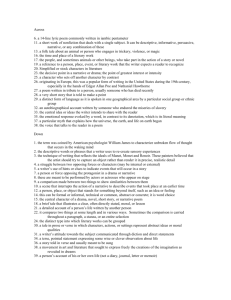
Grade 7 Writing
Personal Narrative
Scoring Guide
April 2013
Copyright © 2013, Texas Education Agency. All rights reserved. Reproduction of all
or portions of this work is prohibited without express written permission from Texas
Education Agency.
Grade 7 Writing
Personal Narrative Prompt
Look at the picture below.
©iStockphoto.com/Jacom Stephens
Some activities are more enjoyable when you share them with other
people.
Write a personal narrative about a time when you had fun participating
in an activity with other people. Be sure to write about your experience
in detail and describe why it was memorable.
STAAR Grade 7 Personal Narrative
Score Point 1
The narrative represents a very limited writing performance.
Organization/Progression
The form or structure of the narrative is inappropriate to the purpose or the specific
demands of the prompt. The writer uses organizational strategies or literary devices
that are only marginally suited to the narrative task, or they are inappropriate or
not evident at all. Because the narrative is presented in a random or illogical way,
the writer is not able to convey a sense of the experience.
Many of the details do not contribute to the narrative. The writer’s lack of focus on
a specific personal experience weakens the unity and coherence of the narrative.
The writer’s narrative presentation is weak. Repetition or wordiness sometimes
causes serious disruptions in the story line. At other times the lack of transitions
and sentence-to-sentence connections makes one or more parts of the narrative
unclear or difficult to follow.
Development of Ideas
The development of the narrative is weak because the details are inappropriate,
vague, or insufficient. They do not contribute to the writer’s portrayal of the
experience.
The narrative is insubstantial because the writer’s response to the prompt is vague
or confused. In some cases, the narrative as a whole is only weakly linked to the
prompt. In other cases, the writer fails to establish a realistic situation, present
motivations for behavior or actions, or show any awareness of changes or insights
that developed as a result of the experience.
Use of Language/Conventions
The writer’s word choice may be vague or limited. It reflects little or no awareness of
the narrative purpose. The word choice impedes the writer’s ability to relate the
experience clearly or to convey a sense of its importance or meaning.
Sentences are simplistic, awkward, or uncontrolled, weakening the effectiveness of
the narrative.
The writer has little or no command of sentence boundaries and age-appropriate
spelling, capitalization, punctuation, grammar, and usage conventions. Serious and
persistent errors create disruptions in the fluency of the writing and sometimes
interfere with meaning.
Texas Education Agency
Student Assessment Division
April 2013
STAAR Grade 7
April 2013
Personal Narrative – 1
Score Point 1
In this very limited writing performance, the writer states that he does not usually engage in
activities with others, but when it comes to having fun, he thinks the person you do the
activity with is more important than the choice of activity. The development is weak because
the details are inappropriate to the narrative task and do not contribute to the writer's portrayal
of a personal experience. Instead, the writer describes possible activities that could be
enjoyable with friends, siblings, or family. The writer’s confusion about the writing task
hinders the effectiveness of the response.
STAAR Grade 7
April 2013
Personal Narrative – 2
Score Point 1
The writer focuses on a time when she and her friends had a good time practicing the shot put.
To help the reader understand why this group activity was fun, the writer develops the
composition with details about David falling on his face and Annie laughing so hard that she
also fell. However, the absence of sentence boundaries disrupts the fluency of the writing and
indicates the writer’s inability to construct basic sentences, resulting in a very limited writing
performance.
STAAR Grade 7
April 2013
Personal Narrative – 3
Score Point 1
This very limited response focuses on a time when the writer had fun with friends on the first
day back at school. Maintaining an appropriate narrative form, the writer briefly and generally
describes the day’s activities. The lack of details limits the reader’s understanding of the
experience. In addition, uncontrolled sentences and persistent errors in spelling and grammar
create disruptions in the fluency of the writing, weakening the effectiveness of the narrative (I
know I was but the day end and we all when’t home an till the next day when we see each
other for the rest of the year).
STAAR Grade 7
April 2013
Personal Narrative – 4
Score Point 1
This narrative is based on a time when the writer enjoyed a fishing trip with family members.
The writer briefly describes the activities that made the experience enjoyable and memorable,
but the development is weak because the details are vague and insufficient. In addition,
serious and persistent errors in spelling (grope, seam, minets) and sentence boundaries create
disruptions in the fluency of the writing and weaken the effectiveness of the narrative.
Overall, this is a very limited writing performance.
STAAR Grade 7 Personal Narrative
Score Point 2
The narrative represents a basic writing performance.
Organization/Progression
The form or structure of the narrative is evident but may not always be appropriate
to the purpose or responsive to the specific demands of the prompt. The writer uses
organizational strategies or literary devices that are only somewhat suited to the
narrative task. The writer is able to convey some sense of the experience but may
not be able to communicate its importance or meaning.
Some details do not contribute to the narrative. The writer may focus on a specific
personal experience but may not sustain that focus, limiting the unity and
coherence of the narrative.
The writer’s narrative presentation is inconsistent. Sometimes repetition or
wordiness causes minor disruptions in the story line. At other times transitions and
sentence-to-sentence connections are too perfunctory or weak to support the
logical movement of the narrative or establish a link between the experience and its
meaning.
Development of Ideas
The development of the narrative is minimal and remains at a surface level because
there are few details, they are not always appropriate, or they are too general. For
the most part, the details contribute only marginally to the writer’s portrayal of the
experience and provide the reader with little or no understanding of why this
experience was meaningful.
The narrative reflects little or no thoughtfulness. In some cases, the writer’s
response to the prompt is formulaic and demonstrates only a limited understanding
of the writing task. In other cases, the writer establishes some elements of a
realistic situation but may provide few motivations for behavior or actions. In
addition, the writer may not address changes or insights that developed as a result
of the experience.
Use of Language/Conventions
The writer’s word choice may be general or imprecise. It reflects a basic awareness
of the narrative purpose. The word choice limits the writer’s ability to relate the
experience clearly or to convey a sense of its importance or meaning.
Sentences are awkward or only somewhat controlled, limiting the effectiveness of
the narrative.
The writer demonstrates a partial command of sentence boundaries and ageappropriate spelling, capitalization, punctuation, grammar, and usage conventions.
Some distracting errors may be evident, at times creating minor disruptions in the
fluency or meaning of the writing.
Texas Education Agency
Student Assessment Division
April 2013
STAAR Grade 7
April 2013
Personal Narrative – 5
Score Point 2
Focusing on a time he had fun at Schlitterbahn with his brothers and cousins, the writer
explains that the experience was meaningful because he typically does not spend that much
time with his brothers, who are in the Army. The writer recounts the events of the day, from
being in the wave pool to doing back flips in the water, but the development remains
superficial because the details are general. The sentences are somewhat controlled, but
repetition (always have fun, that was fun; happy to spend time, don’t have time to spend)
causes minor disruptions in the story line, resulting in a basic writing performance.
STAAR Grade 7
April 2013
Personal Narrative – 6
Score Point 2
This writer focuses on a family vacation in Washington, D.C. The narrative moves through
time as the writer lists places they visited, such as the White House and the Smithsonian, and
mentions what made the experience memorable (spending time with family). However, the
development remains at a surface level because much of it is general and contributes only
marginally to the writer's portrayal of the experience (he was awesome; the things we saw
were just so amazing). Overall, this personal narrative represents a basic writing performance.
STAAR Grade 7
April 2013
Personal Narrative – 7
Score Point 2
In this personal narrative, the writer spends an evening playing games with family friends.
The narrative structure is appropriate; the story progresses through time with the friends
playing pool and then agreeing to play UNO while the writer also watches a movie. However,
these events are described superficially with imprecise word choice (There was a thing if
someone did something to mess up your turn you got them back for it). The narrative reflects
little thoughtfulness, resulting in a basic writing performance.
STAAR Grade 7
April 2013
Personal Narrative – 8
Score Point 2
This writer focuses on a trip to Galveston with his family. While the story progresses through
time, the development is surface level (found a lot of stuff for our beach house). For the most
part, the details contribute only marginally to the writer's portrayal of the experience and
provide the reader with little understanding of why this experience was meaningful.
Additionally, some distracting spelling errors are evident, and the sentences are only
somewhat controlled, limiting the effectiveness of this writing performance.
STAAR Grade 7 Personal Narrative
Score Point 3
The narrative represents a satisfactory writing performance.
Organization/Progression
The form or structure of the narrative is, for the most part, appropriate to the
purpose and responsive to the specific demands of the prompt. The writer uses
organizational strategies or literary devices that are adequately suited to the
narrative task. The writer is able to clearly convey the experience and adequately
communicate its importance or meaning.
Most details contribute to the effectiveness of the narrative. The writer focuses on a
specific personal experience and generally sustains that focus. The narrative is
coherent, though it may not always be unified due to minor lapses in focus.
The writer’s narrative presentation is adequately controlled. For the most part,
transitions are meaningful, and sentence-to-sentence connections are sufficient to
support the logical movement of the narrative and establish a link between the
experience and its meaning.
Development of Ideas
Specific details add some substance to the narrative. For the most part, these
details contribute to the writer’s portrayal of the experience and provide the reader
with some understanding of why this experience was meaningful.
The narrative reflects some thoughtfulness. The writer demonstrates a good
understanding of the writing task by establishing a realistic situation, providing
reasonable motivations for behavior or actions, and addressing (at least to some
degree) changes or insights that developed as a result of the experience.
Use of Language/Conventions
The writer’s word choice is, for the most part, specific and concrete. It reflects an
awareness of the narrative purpose. Generally effective word choice allows the
writer to relate the experience clearly and to convey some sense of its importance
or meaning.
Sentences are varied and adequately controlled, for the most part contributing to
the effectiveness of the narrative.
The writer demonstrates an adequate command of sentence boundaries and ageappropriate spelling, capitalization, punctuation, grammar, and usage conventions.
Although some errors may be evident, they create few (if any) disruptions in the
fluency of the writing, and they do not affect the clarity of the narrative.
Texas Education Agency
Student Assessment Division
April 2013
STAAR Grade 7
April 2013
Personal Narrative – 9
Score Point 3
The writer focuses on how much he enjoys going fishing at the lake with his mother. To
establish why fishing is important to him, the writer opens the composition with a rhetorical
question about kissing a fish and describes how he and his mom always have a great time
when they go fishing together. He then relates a story about catching a perch, kissing it, and
then having nothing but good luck. This story both ties back to the opening rhetorical question
and leads to the writer’s conclusion that he wouldn’t have had a good time if his mom hadn’t
been there. The conventions are controlled, and specific details add some substance to the
narrative. The writer is able to clearly convey the experience and adequately communicate its
importance. Overall, this represents a satisfactory writing performance.
STAAR Grade 7
April 2013
Personal Narrative – 10
Score Point 3
In this satisfactory writing performance, the writer relates a skateboarding incident,
establishing a realistic situation and providing reasonable motivations for his preference to
skateboard with friends (skating alone is no fun because you can do an awesome trick, but
nobody would see it to believe it). The details add some substance to the narrative as the
writer addresses how he dislocated his elbow, how his friends talked him into letting the
paramedics snap it back into place while cameras rolled, and how he became known as the
“Dislocator” due to this dramatic event. The writer demonstrates an adequate command of
conventions, and the word choice is, for the most part, specific and concrete, reflecting an
awareness of the narrative purpose.
STAAR Grade 7
April 2013
Personal Narrative – 11
Score Point 3
The writer focuses on a time he spent with his friend at Celebration Station in this satisfactory
writing performance. The writer maintains an appropriate narrative form as he recounts the
events of the day, from riding go-karts to eating lunch to riding go-karts again. Specific details
add some substance to the narrative (when the light turned green, we slammed on the gas),
and some thoughtfulness is evident as the writer reflects on what that day meant to him (We
left the go-Karts with a smile on our faces). The writer’s word choice throughout the response
reflects an awareness of the narrative purpose and allows the writer to relate the experience
clearly.
STAAR Grade 7
April 2013
Personal Narrative – 12
Score Point 3
In this satisfactory writing performance, the writer focuses on a time she went to a church
retreat that would not have been fun without her friends. The writer maintains appropriate
narrative form and demonstrates an adequate command of conventions. Specific details, such
as sitting by the fire, stargazing, and staying up late, add some substance to the development.
The response progresses through the activities of the weekend to a brief reflection in the
conclusion (When you have a friend with you, it makes things so much better). Overall, the
writer is able to clearly convey the experience and adequately communicate why it was
memorable.
STAAR Grade 7 Personal Narrative
Score Point 4
The narrative represents an accomplished writing performance.
Organization/Progression
The form or structure of the narrative is appropriate to the purpose and responsive
to the specific demands of the prompt. The writer uses organizational strategies or
literary devices that are particularly well suited to the narrative task. The writer is
able to skillfully convey the experience and communicate its importance or
meaning.
All details contribute to the effectiveness of the narrative. The writer focuses on a
specific personal experience and sustains that focus, strengthening the unity and
coherence of the narrative.
The writer’s narrative presentation is well controlled. Meaningful transitions and
strong sentence-to-sentence connections enhance the logical movement of the
narrative and reinforce the link between the experience and its meaning.
Development of Ideas
Specific, well-chosen details add substance to the narrative. These details
contribute significantly to the writer’s portrayal of the experience and provide the
reader with a clear understanding of why this experience was meaningful.
The narrative is thoughtful and engaging. The writer demonstrates a thorough
understanding of the writing task by establishing a realistic situation, providing
plausible motivations for behavior or actions, and revealing changes or insights that
developed as a result of the experience.
Use of Language/Conventions
The writer’s word choice is vivid and expressive. It reflects a keen awareness of the
narrative purpose. Effective word choice enables the writer to recreate the
experience in a way that conveys its importance or meaning.
Sentences are purposeful, varied, and well controlled, enhancing the effectiveness
of the narrative.
The writer demonstrates a consistent command of sentence boundaries and ageappropriate spelling, capitalization, punctuation, grammar, and usage conventions.
Although minor errors may be evident, they do not detract from the fluency or
clarity of the writing. The overall strength of the conventions contributes to the
effectiveness of the narrative.
Texas Education Agency
Student Assessment Division
April 2013
STAAR Grade 7
April 2013
Personal Narrative – 13
Score Point 4
This writer bases his response on the time he had an extraordinary day at a water park with his
friend. The purposeful, well-controlled sentences and the vivid word choice (we poured into
the water park, slathered on sunscreen, endeavored to ride the half-pipe) enable the writer to
skillfully convey the experience and its importance (In the fun of it all, the time flew by, but
without James, the day at the water park would have been average). In addition, the strong
conventions enhance the effectiveness of this accomplished writing performance.
STAAR Grade 7
April 2013
Personal Narrative – 14
Score Point 4
All details contribute to the effectiveness of this accomplished narrative about the time the
writer and her teammates won their first basketball game. Effective word choice and engaging
development enable the writer to skillfully communicate the moment of the team's victory and
its importance. In the conclusion, the writer reflects on the impact of the experience (learning
to work together to accomplish goals), enhancing the effectiveness of the narrative. With
varied sentences and a consistent command of conventions, the writer demonstrates a
thorough understanding of the narrative writing task.
STAAR Grade 7
April 2013
Personal Narrative – 15
Score Point 4
The writer of this accomplished piece focuses on the time she unexpectedly had fun
socializing with her friends at a Valentine’s Day dance. The writer prefaces the events of the
dance by describing her normally solitary routine in order to provide context for why her
change in attitude is so significant. Specific, well-chosen details add substance to the
narrative, and the writer’s consistent control of conventions is evident as she effectively
incorporates dialogue into the response. The narrative is thoughtful and engaging, providing
plausible motivations for behavior and revealing insights that developed as a result of the
experience.
STAAR Grade 7
April 2013
Personal Narrative – 16
Score Point 4
The writer focuses on the time she and her friends rode a zip-line in a Costa Rican jungle.
This accomplished writer uses vivid word choice (zooming through the trees; hooting like
Tarzan; speed was intense; exquisite world) and employs varied sentence structure to reveal
why the experience was meaningful. Overall, the writer demonstrates a thorough
understanding of the narrative writing task.






